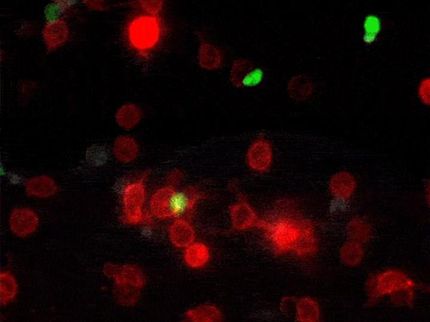Autoimmune disorders and regulatory B cells – marker identified
Autoimmune disorders such as rheumatism or type 1 diabetes are on the increase world-wide. Regulatory immune cells protect healthy individuals from the disorders and combat disease progression in affected individuals. So far, little is known about the group of regulatory B cells which play a role in this context. Researchers of the Paul-Ehrlich-Institut (PEI) and the University Hospital of Würzburg found a marker, the tumour necrosis factor receptor 2 (TNFR2), which makes it possible to identify and enrich these cells.

3D model of a B cell
Paul-Ehrlich-Institut
The immune system is a complex and precisely regulated system. Various activating and inhibiting signals ensure that the immune cells combat pathogenic agents without eliciting a potentially harmful response to its own structures and cells. However, if those two forces are imbalanced, the immune cells may attack and damage cells and tissue of the body itself, which will result in the development of autoimmune diseases such as type 1 diabetes, rheumatism or multiple sclerosis.
The control of activating and inhibiting processes is mediated by transmitters of the immune system (cytokines). One of the most important anti-inflammatory cytokines released by regulatory immune cells is interleukin-10 (IL-10). Many indications reveal that IL-10-producing B lymphocytes, a group of white blood cells, can also mediate regulatory effects which inhibit disease progression or help to accelerate the anti-inflammatory processes.
It has not yet been fully understood whether the Il-10 producing B cells are a subgroup of the B lymphocytes or whether B lymphocytes become regulatory B cells under certain circumstances. Most of the studies previously performed for this purpose are based on data from animal experiments. A major obstacle in studying regulatory B cells in humans is that humans lack the specific surface marker with which this specific group of B cells can be identified.
Professor Isabelle Bekeredjian-Ding, head of Division Microbiology of the Paul-Ehrlich-Institut and her research team together with Professor Harald Wajant, head of the Division of Molecular Internal Medicine of the University Hospital in Würzburg, proved that IL-10-producing B cells could be identified and sorted by tumour necrosis factor receptor 2 (TNFR2). "Based on our research results TNFR2 can be used as a marker for IL-10-secreting B cells in infections and autoimmune diseases. What remains to be clarified is the role for TNFR2-expressing B cells in the development and progression of immune-mediated disorders and infections. This requires studies in patients", says Professor Isabelle Bekeredjian-Ding.
Original publication
Most read news

Get the analytics and lab tech industry in your inbox
By submitting this form you agree that LUMITOS AG will send you the newsletter(s) selected above by email. Your data will not be passed on to third parties. Your data will be stored and processed in accordance with our data protection regulations. LUMITOS may contact you by email for the purpose of advertising or market and opinion surveys. You can revoke your consent at any time without giving reasons to LUMITOS AG, Ernst-Augustin-Str. 2, 12489 Berlin, Germany or by e-mail at revoke@lumitos.com with effect for the future. In addition, each email contains a link to unsubscribe from the corresponding newsletter.























































